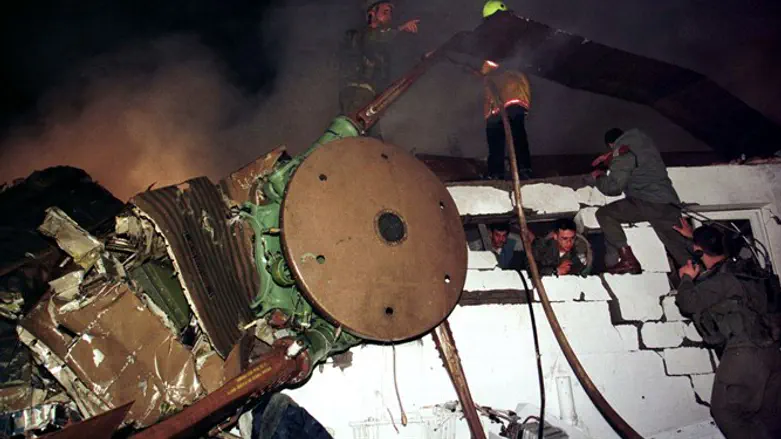
Twenty-two years ago, Radai Phils was one of the first paramedics to arrive at the site of the helicopter disaster, when two Israeli Air Force (IAF) helicopters transporting soldiers into Israel's security zone in southern Lebanon crashed into each other mid-air, killing all 73 IDF personnel aboard.
The disaster, the deadliest air crash in Israeli history left a permanent scar on the hearts of Israelis and contributed to Israel's decision to withdraw from southern Lebanon in 2000. Most of the victims were young soldiers in their late teens or early 20s, and in a small country like Israel, almost everybody knew at least one of the victims.
Following the crash, scores of rescue crews swarmed to the scene including soldiers, firefighters and MDA forces, which brought 20 ambulances and two ICU units to the disaster scene. But sadly, the rescue services had no one to rescue - there were no survivors. Instead, rescue services concentrated on controlling the fires which ensued from the spilled gasoline and the explosions from weapons stored on the helicopters.
One young IDF paramedic, Radai Phils, was the first to arrive on the scene and the horrible images of that day were seared on his mind for the next 22 years. After battling with post-traumatic shock disorder (PTSD) since the incident, Pils ended his life this week at the age of 42.
Ynet interviewed Phils' childhood friend, Shaked Sroit, on Tuesday, who spoke about the Pil's long battle with PTSD, saying that the horrifying sights Phils saw at the scene of the crash made it impossible for him to live a normal life.
"Essentially he suffered from PTSD and all these years he tried to fight and live like everyone else," Sroit said. "He fought both an internal battle, against his memories and thoughts, and also an external battle to receive what he needed to continue."
"He was extremely loved. He had many many friends and he loved to help people. On the other hand, he also was very closed. And when you go through something and no one can understand what you went through, it's extremely difficult to talk about it all the time. But he spoke about if often with his close friends."
"He entered an inferno and he essentially never emerged from this inferno. He essentially was like the walking living for 22 years - he would re-experience the smells, the sights - night after night."
Sroit placed blame on the government, who in her opinion, didn't provide enough help to Radai. "Radai was one of the few who didn't respond to any medication, nothing helped. He simply was constantly fighting against the demons in his head. He never had the help that one would expect for boys going to war or helping other people."
Sroit said that Phils did receive a disability pension but only about NIS 700 ($200). "It was impossible for him to reach the end of the month with an amount like that," she said, adding that the process of proving eligibility for assistance is fraught with problems, especially for someone who suffers from mental difficulties.
"There were better times, there were less good times - but his internal war was enough. His battle against the army and to receive recognition was terribly debilitating for him and his family and those around him. The process requires you to prove that you're not okay. For a person who can barely manage to leave his bed and function, this is a horrible position to be in - especially for a person whose daily life is so difficult."
Sroit feels that Radai is essentially the 74th victim of the helicopter disaster. "We know that in every war, every incident, there are the fatalities that are counted, and there are the quiet fatalities, who are still alive but not alive - what Radai was for 22 years."